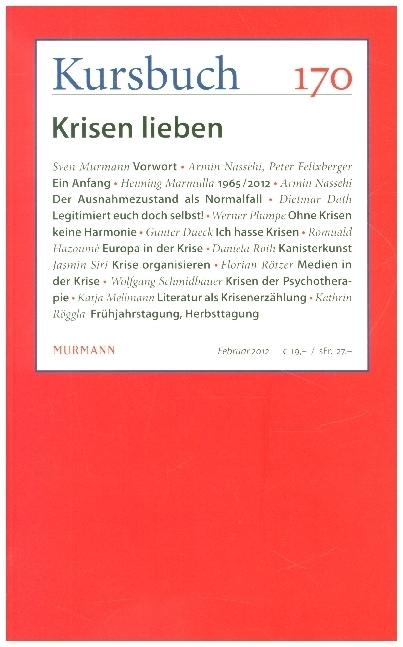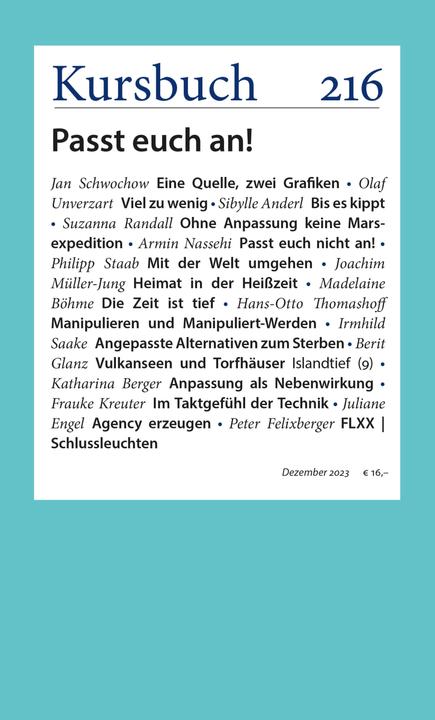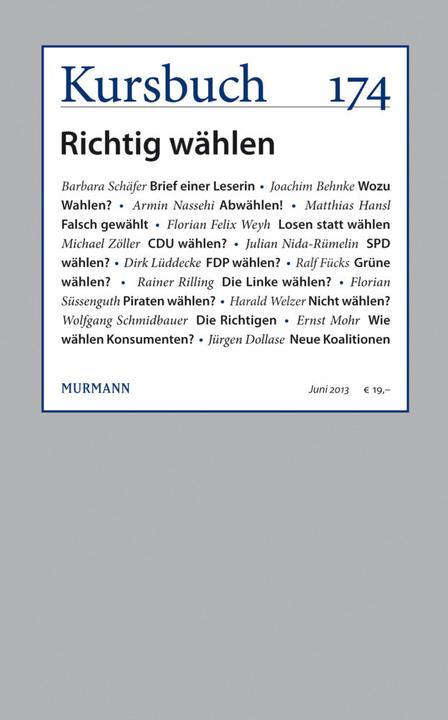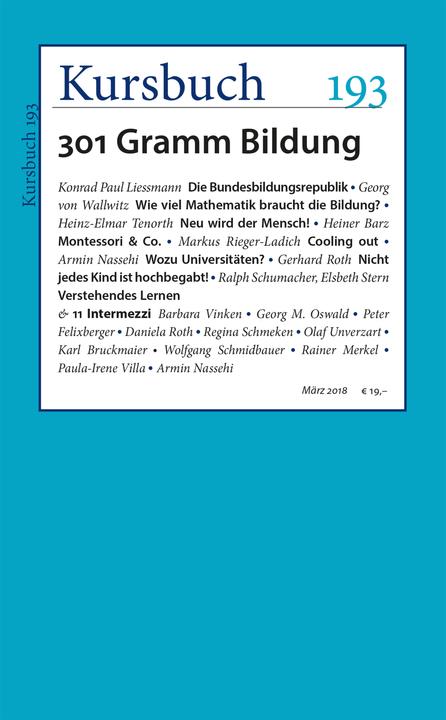
Best Kursbuch Kulturstiftung products in the Textbooks category
On this page you'll find a ranking of the best Kursbuch Kulturstiftung products in this category. To give you a quick overview, we've already ranked the most important information about the products for you.
1. Kursbuch Kulturstiftung Kursbuch Nr. 170
The Kursbuch has been an institution for decades. It was founded in 1965 by Hans Magnus Enzensberger in collaboration with Karl Markus Michel and soon developed into the opinion-forming organ of the Republic, significantly shaping the intellectual discourses of the country. Starting in February 2012, the Kursbuch will be published three times a year again. This revives one of the most important cultural media of the last 50 years. The Kursbuch aims to become an institution once more - continuing with issue number 170. Authors from science, business, culture, and media will reflect on what shapes and changes modern societies, what drives and hinders them, and what liberates and constrains them. The editor will be the renowned sociology professor Armin Nassehi from Munich. The editor-in-chief is the publicist and political scientist Peter Felixberger.

2. Kursbuch Kulturstiftung Kursbuch 216
"Adaptation" has a bad reputation. Those who adapt conform instead of setting their own accents. It is almost a derogatory term, nearly synonymous with cowardice, and certainly with passivity. This course book therefore demands: Adapt! Because adaptation is only passive at first glance. Almost all contributions in this course book indicate that adaptation is a highly complex process. It becomes clear: We are already adapted! And even when we actively engage with things and do not want to conform, we still need to adapt to the circumstances. Without adaptive behavior and adaptive strategies, there is no overcoming of adaptation. This is clearly illustrated in the contribution by Joachim Müller-Jung, who explores the possibilities and limits of human adaptation to the consequences of climate change. Frauke Kreuter, on the other hand, asks how artificial intelligence and society relate to each other. Hans-Otto Thomashoff demonstrates that conflicts, binary schemas, friend/enemy distinctions, and social interaction in general always involve mutual adaptation efforts that can stabilize to such an extent that there is no way out. Sibylle Anderl draws attention to non-linear forms of order formation, feedback loops, and the fact that evolutionary processes tend to lead to increases in complexity as a natural law. Finally, paleo-climatologist Madeleine Böhme shows that there have been warming phases in Earth's history before and how they relate to the current anthropogenic changes. The intermezzo question this time was: How adapted are you? Responses from Katharina Berger, Juliane Engel, Suzanna Randall, Irmhild Saake, Philipp Staab, and Olaf Unverzart.

3. Kursbuch Kulturstiftung Kursbuch Nr. 174
Who should we vote for in the next federal election? The era of certainties is over. Social democracy is becoming more neoliberal, while the Union is becoming more social democratic. The Greens and Liberals are also abandoning their core principles. In the end, we might only be choosing from the dazzling spectacle of election propaganda. This has consequences: Which wolf is hiding in which sheep's clothing? And who protects the bleating voters from the trauma of post-election repercussions?.

4. Kursbuch Kulturstiftung Kursbuch 193
It is considered a universal solution for almost every challenge of our time. Today, it holds the status of a civil, if not human, right. All the more astonishing is the stagnation of the recurring discussions about education. It is a topic for this course book. Education is spoken of, especially since humanity's essence is questioned without it. Education should be the force that makes a person what they truly are. Not without reason are educational qualifications at least as suitable for social distinction as material possessions or an elegant appearance. The expectations are therefore high – and since they are so high, education is regarded as the most powerful tool for solving global problems – at least neither money nor beauty suffice if they are not enriched with education and its benefits. This course book does not contradict that – how could it? It is aimed at an educated readership. However, it acknowledges that the world’s problems are still unsolved and that the radical expansion of the education system over the past 250 years has rather produced more of the known issues. It also takes into account the question of why educational discourses repeatedly gain momentum and then ultimately lead nowhere. And why they strangely resemble each other more than the enthusiasm of education reformers might suggest. With contributions from Konrad Paul Liessmann, Georg von Wallwitz, Heinz-Elmar Tenorth, Heiner Barz, Markus Rieger-Ladich, Armin Nassehi, Gerhard Roth, Ralph Schumacher, and Elsbeth Stern.
